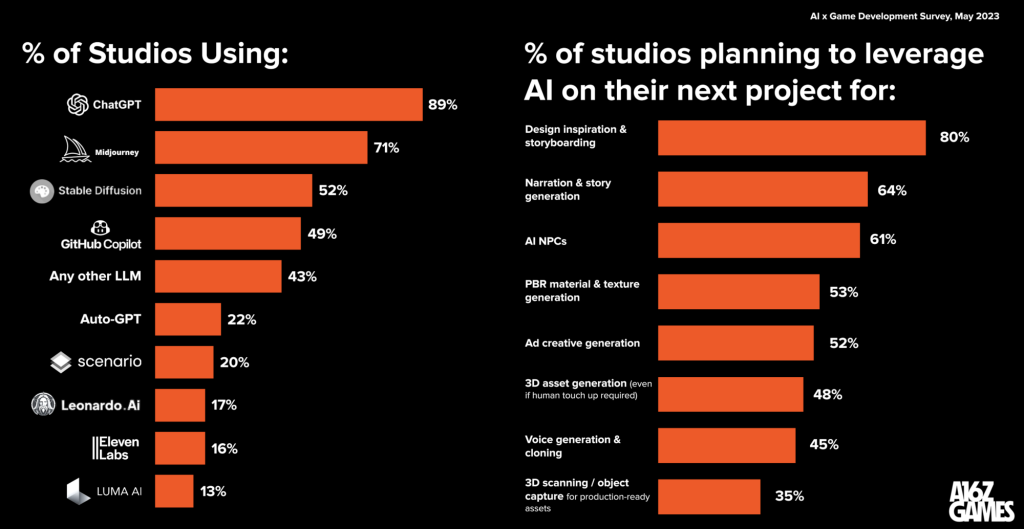How generative AI is changing everything for games
Here’s the latest update that has been a long time coming. Back in February, I wrote a post about generative AI in games on LinkedIn. More than half a year later, I feel it’s time to return to generative AI and games as the outlook is clearer with three discernible trends:
- Ubiquitous use
- Narrative storytelling
- Turmoil
It’s everywhere!
Beginning with the first trend, almost everyone is using generative AI. It is clear it is a game changer for big and small studios alike. Generative AI enables small studios, or even solo developers, to punch above their weight by having access to high quality content. Bigger studios on the other hand, are able to slash content budgets considerably while maintaining similar quality. In May, Andreessen Horowitz conducted this survey of 243 studios and concluded that nearly 90 percent of studios already use an AI tool or model. Read more about the demographics of the survey:

Two charts tell the story of current and future use. Unsurprisingly ChatGPT and Midjourney were the two most commonly used AI tools, but nearly half of respondents state they use other large language models (LLMs) too. Open source perhaps?
Specialized tools for games are also gaining ground. Graphics assets generating tools like Scenario (mentioned in my earlier games post) coming in at seventh and Leonardo.AI closely following at eight position. Half of responding studios are also planning to use generative AI for more specialized use cases like generating render textures and 3D assets.
What’s the story, morning glory?
Almost two thirds are looking to leverage AI for narration and story generation which leads us to the second trend, narrative storytelling. By design LLMs are especially apt for narration. However, these models can also be quite unwieldy and prone to meandering, of which those who used ChatGPT for story telling or playing text-based adventures are painfully aware. For some sense of dramaturgy and stringency, prompts need to be carefully constructed and API calls cleverly staggered and engineered.

Danish startup behind a storytime app for kids called Superland, is able to stitch it together nicely and demonstrate the burgeoning potential of precise use of generative AI for a personalized storytime experience based on a limited set of inputs. Additionally, Superland also demonstrates how generative AI audio generation can cut content costs by eliminating the need to shell out $200 per minute for voice recording.
Another example of a combination of using LLMs with content generation is the paper/project SHOW-1. Here the South Park IP is cheekily used to demonstrate how prompting of LLM agents can write, animate, voice and direct a full South Park episode. It is admittedly stale in delivery of lines and the story isn’t particularly interesting or funny but one can easily imagine how an extension of this a few years in the future can transform entertainment and games creation.
In contrast to the autonomous and human-out-of-the-loop nature of SHOW-1, a group of US researchers have demonstrated how a system of LLM interfaces can provide creative assistance to human role-playing dungeon masters—supporting, instead of replacing the human.
Turmoil and creative destruction
The last trend is the turmoil on many fronts caused by the generative AI paradigm. The flip side of the coin of the cost-saving possibilities of the technology is how it impacts the livelihoods of all those creating all that content that GPUs are now churning out. From an economic perspective, this disruptive process of transformation is typically referred to as creative destruction. In this process transformative innovation is accompanied by lost jobs, ruined companies, and vanishing industries. Voice actors have already voiced [sic] their concern about voice cloning. Someone has also already created a user-made mod for Skyrim that replaces all lines of the lead character with the voice of Victoria Atkin’s rendition of the character Evie Frye from Assassin’s Creed Syndicate.
Additional turmoil is caused by uncertainty in what has been used to train these new generative models as well as the IP rights of the output. Steam recently declined to publish games with AI art because “there is some legal uncertainty relating to data used to train AI models”. OpenAI and Meta are also on the receiving end of a class action lawsuit signed by comedian Sarah Silverman among others for using the now taken down dataset books3 containing over 180k books in training ChatGPT and Llama respectively.

